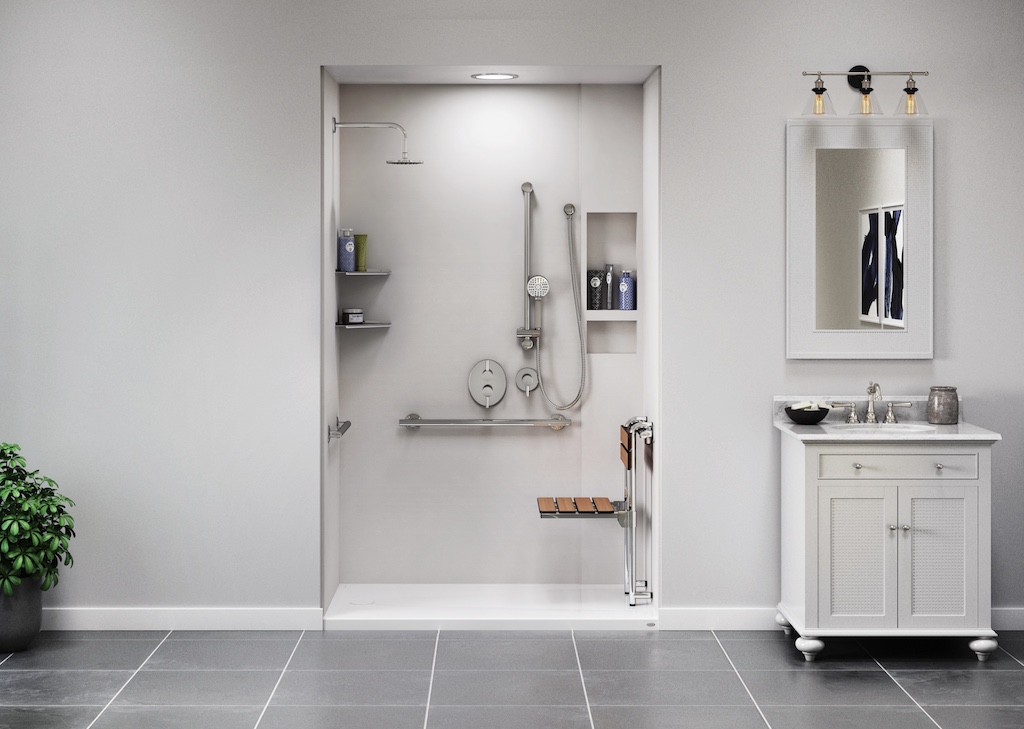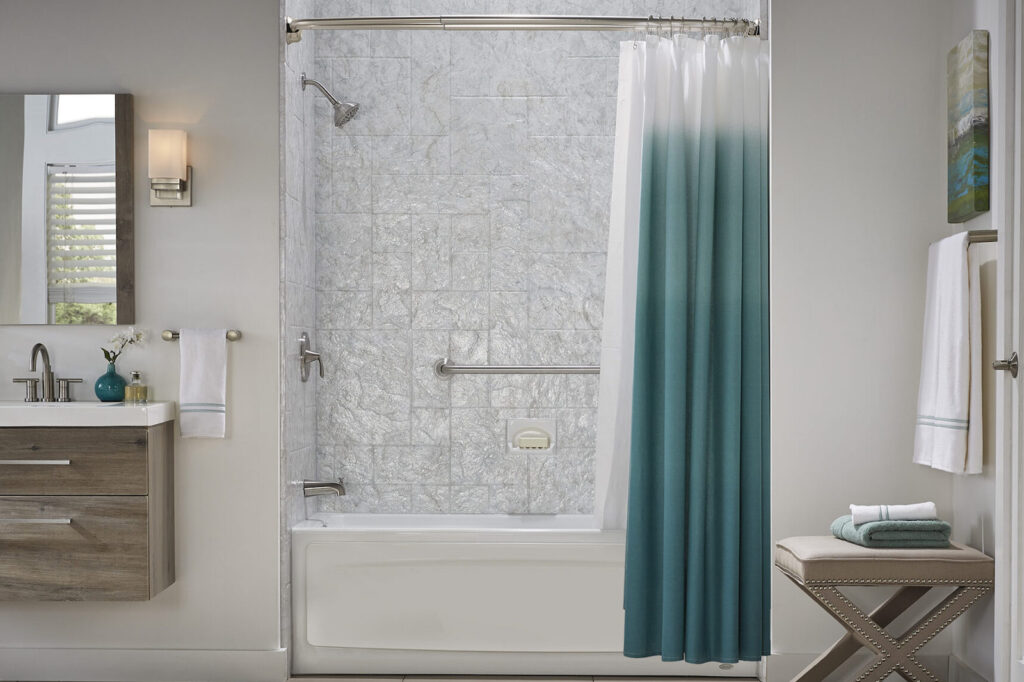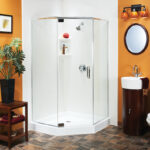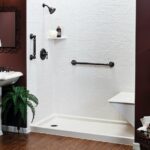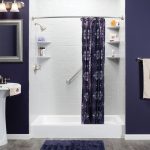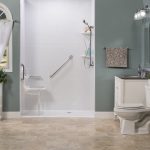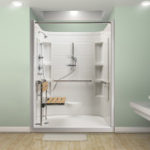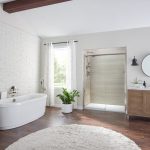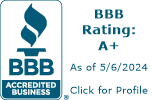What Shower Material is Simple to Clean, Keeps Its Sheen, and Stays Pristine?
Choosing the right material for your shower replacement is a critical decision during a bathroom remodel. Not only does it impact the aesthetics and functionality of your space, but it also determines how much time and effort you’ll spend maintaining it. For most homeowners, cleaning is a significant consideration. After all, who wants to spend hours scrubbing grout lines or dealing with water stains? If this sounds like you, then you’ve likely wondered: What shower material is easiest to clean?
Fortunately, the answer is clear—acrylic showers. Known for their low maintenance and durability, acrylic showers have become a top choice among homeowners. But before we dive into why acrylic stands out, let’s explore the pros and cons of the most common shower materials on the market.
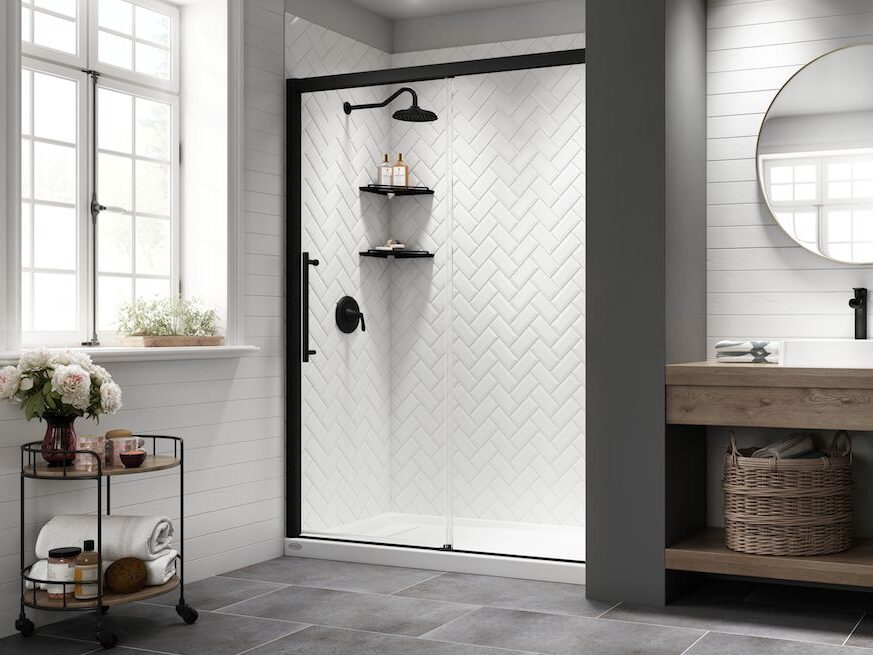
Common Shower Materials and Their Cleaning Challenges
When choosing a material for your new shower installation, it’s important to consider not just its aesthetic appeal but also its cleaning and maintenance requirements. Some materials are naturally low maintenance, while others demand more effort to keep them looking their best. Factors like porosity, surface texture, and the presence of grout lines can significantly impact how easy or difficult a material is to clean.
Ceramic Tile
- Pros: Ceramic tile is a classic choice for its versatility and attractive appearance. With endless options for patterns, colors, and textures, it’s easy to create a personalized look.
- Cons: The biggest drawback is the grout. Grout lines are porous and prone to absorbing moisture, soap scum, and dirt. Cleaning grout often requires intense scrubbing and the use of specialized cleaners. Over time, even the best-maintained grout can discolor or grow mold and mildew.
Natural Stone (e.g., Granite or Marble)
- Pros: Offers a luxurious, high-end look that can elevate any bathroom. Each stone has a unique texture and color pattern, giving your shower a one-of-a-kind appearance.
- Cons: Natural stone is porous, making it susceptible to water stains, soap scum buildup, and mold. To prevent damage, you’ll need to regularly seal the surface, which adds to the maintenance workload.
Glass Showers
- Pros: Frameless glass enclosures are sleek, modern, and elegant. Their minimal seams and grout-free design make them easier to clean than tiled showers.
- Cons: Glass shows water spots and streaks more easily than other materials. While cleaning is straightforward, it requires frequent upkeep to maintain its clarity.
Fiberglass
- Pros: A budget-friendly option that’s lightweight, durable, and easy to install. Fiberglass showers are often chosen for their affordability and convenience.
- Cons: While easier to clean than tile or stone, fiberglass is prone to scratches, fading, and staining over time. These imperfections can make the surface harder to maintain.
Laminate
- Pros: Laminate panels come in large, seamless sheets that mimic natural materials like stone or tile. They’re affordable, easy to install, and very low maintenance.
- Cons: Although laminate is simple to clean, it’s less durable than acrylic or stone and may not hold up well in high-traffic bathrooms.
Porcelain
- Pros: Similar to tile but available in larger panels, porcelain offers a cleaner, more modern aesthetic. Its larger size means fewer grout lines to maintain.
- Cons: Like tile, porcelain often requires sealing to make it water-resistant. Without proper sealing, it’s susceptible to staining and moisture damage.
Why Acrylic Is the Easiest Shower Material to Clean
When it comes to low-maintenance shower materials, acrylic stands out as the top choice for homeowners seeking convenience and durability. Its innovative properties make cleaning a quick and effortless task, allowing you to spend less time scrubbing and more time enjoying your bathroom. Choosing acrylic instead of tile and other material results in a better shower experience. Here’s why:
Nonporous Surface
One of acrylic’s biggest advantages is its nonporous construction, which resists water, soap scum, and grime. Unlike tile or stone, acrylic doesn’t absorb moisture, making it naturally resistant to mold and mildew. This eliminates the need for harsh scrubbing or specialized cleaners—just a quick wipe with a mild detergent and cloth is enough to keep it spotless.
Durability
Acrylic is designed to stand the test of time. It’s resistant to scratching, fading, and staining, which means your shower will maintain its like-new appearance for years with minimal upkeep. High-quality acrylic systems are even treated with antimicrobial technology, like SilverShield®, which prevents bacteria, mold, and mildew from taking hold.
Seamless Design
Acrylic showers are installed in large, seamless panels, leaving no grout lines for dirt to hide. This not only simplifies cleaning but also enhances the overall look of your bathroom by creating a smooth, polished finish.
Shower Styles and Their Maintenance Requirements
Choosing the right shower style can significantly impact how much time and effort you’ll spend on maintenance. From seamless designs to modern features, certain shower styles are engineered for easy cleaning and minimal upkeep.
Frameless Glass Showers
- Low Maintenance Features: Minimal seams and grout lines mean fewer areas for grime to collect. A simple daily squeegee and occasional glass cleaner keep them looking new.
- Considerations: While frameless glass showers are easy to clean, they can be prone to water spots and soap scum buildup, requiring frequent maintenance.
One-Piece Fiberglass Showers
- Low Maintenance Features: Molded as a single unit, these showers eliminate grout lines entirely. Their smooth surface is easy to wipe down with a mild cleaner.
- Considerations: Fiberglass may lose its shine over time and is less durable than acrylic, requiring more frequent touch-ups or repairs.
Solid Surface Showers
- Low Maintenance Features: Made from durable composite materials, solid surface showers are seamless, stain-resistant, and even repairable if damaged.
- Considerations: These are a premium option and may have a higher upfront cost compared to acrylic or fiberglass.
Walk-In Showers
- Low Maintenance Features: Grout-free wall panels and curbless designs make cleaning accessible and straightforward.
- Considerations: Walk-in showers often require custom installation, which can add to the initial expense but significantly reduces cleaning hassles.
Cleaning Showers: Tips & Best Practices
Maintaining a clean shower is simple with the right routine and tools. 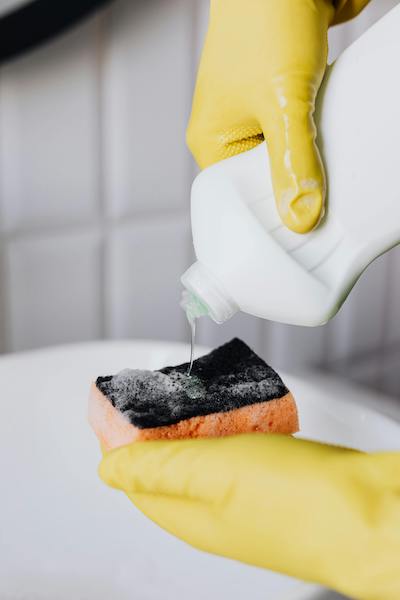
- Start by using a soft cloth, sponge, or microfiber towel
- Choose a mild, non-abrasive cleaner, such as dish soap or a vinegar-water solution, to gently clean surfaces. Avoid harsh chemicals, abrasive pads, or scrubbers, which can damage finishes or leave scratches.
- After each use, rinse the shower walls, doors, and base with water to remove soap residue, then
- Wipe your shower dry with a squeegee or soft cloth to prevent water spots and mineral buildup.
For homes with hard water, applying a vinegar-water spray can dissolve mineral deposits and soap scum. You can also use water-repellent products on glass doors to reduce streaks and stains. Incorporate a weekly deep clean to tackle stubborn grime, focusing on areas prone to mold and mildew. Ensure proper ventilation by running a fan, opening a window, or leaving the shower door ajar after use to reduce moisture buildup.
Protect your shower’s finish by using products designed for specific materials, such as acrylic-safe cleaners. Regularly inspect for wear or damage, and reapply sealants for materials like grout or natural stone as needed. By following these steps, your shower will remain sparkling and easy to maintain for years to come.
Why Choose Atlas Home Improvement for Your Shower Remodel?
At Atlas Home Improvement, we specialize in transforming bathrooms across southeastern Michigan with premium, low-maintenance acrylic shower systems. Our expert team ensures that your new shower is custom-fit to your space and installed to perfection. With our high-quality acrylic materials and seamless designs, you’ll enjoy a beautiful, easy-to-clean shower that stands the test of time.
Ready to upgrade your bathroom? Contact Atlas Home Improvement today for a free consultation and discover how an acrylic shower can simplify your life while enhancing your home. Call us at 734-259-4374 or contact us online to get started!
FAQs About Choosing the Easiest Showers to Clean
Q. How does hard water vs. soft water affect shower maintenance?
- Hard Water: Hard water can leave mineral deposits and water spots on shower surfaces, especially on glass or tile. For households with hard water, acrylic showers are ideal as they resist staining and buildup, and regular cleaning with a vinegar-water solution can easily prevent deposits.
- Soft Water: Soft water reduces the risk of mineral buildup, making it easier to maintain most shower materials. However, soft water can still leave soap scum, so smooth, nonporous surfaces like acrylic are still advantageous for quick cleaning.
Q. Are grout-free showers better for households with allergies?
Yes, grout-free showers like those made from acrylic, fiberglass, or solid surface materials are better for allergy-prone households. Grout lines can trap mold, mildew, and dust, which can aggravate allergies. Smooth, seamless surfaces help minimize these issues.
For families with children, durability and ease of cleaning are key:
- Acrylic showers are highly resistant to stains, scratches, and wear, making them ideal for high-traffic bathrooms.
- Fiberglass is another low-maintenance option, but it’s less durable than acrylic and more prone to scratching.
Q. Which shower material is best for high-humidity environments?
Acrylic is an excellent choice for high-humidity environments because it resists mold and mildew growth, which are more likely in damp conditions. Natural stone, on the other hand, requires regular sealing to prevent moisture damage and mold buildup.
Q. How does water temperature affect shower material performance?
Frequent exposure to hot water can cause some materials, like fiberglass, to warp or fade over time. Acrylic and solid surface materials are more heat-resistant, maintaining their appearance and functionality even in homes where hot showers are common.
Q. How does budget impact the choice of an easy-to-clean shower?
Fiberglass and laminate are cost-effective but may require more maintenance or replacement over time. Acrylic and solid surface materials are more expensive upfront but save money in the long run due to their low maintenance and durability.

